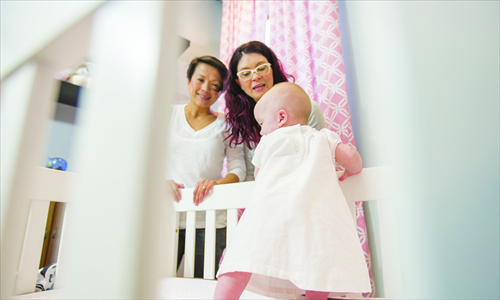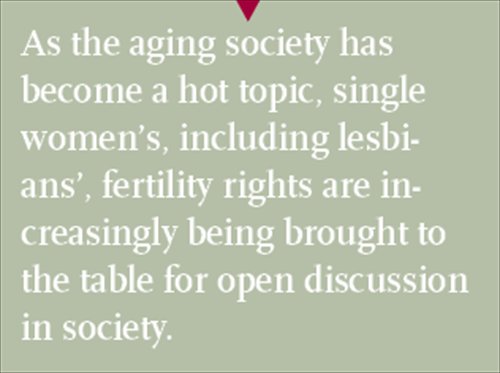Lesbian couples resort to foreign sperm banks to evade domestic restrictions
As China does not acknowledge gay marriage and unmarried women are not allowed to use assisted reproductive technology, more and more lesbian couples in China are now seeking foreign sperm banks and IVF clinics. Experts said as the country is aging, fertility rights of the LGBT group should be guaranteed which will help alleviate the imminent old age problem.

Dou Zi and her wife Zhi Mabing ( both pseudonyms) are expecting the birth of their first babies. Dou and Zhi, a lesbian couple living in Beijing, had their twins not through natural means, but through in-vitro fertilization (IVF) performed with sperm provided by a sperm bank based in the US.
Zhi got pregnant last October and the couple spent about 300,000 yuan ($46,380) on their fertility trip to the US.
"I've always wanted to have my own child. When I met my wife, I knew it was time to do it," said Dou, 34, an NGO worker.
Though Chinese society - while becoming increasingly tolerant toward gay people - has not yet given their relationships legal standing, many still want to have their own biological children both because of their own parental instincts and the traditional belief in the necessity of having a son to carry on the family line.
However, according to the Ministry of Health, unmarried women are forbidden from using assisted reproductive technology. Couples who want to use this technology must present their marriage certificate, ID cards and documents proving that at least one of them has fertility difficulties.
Since gay marriage is not legal, it's impossible for lesbian couples to use IVF in China.
"We've no choice but to go overseas," said Dou.
"In 2010 Chinese lesbian couples began to seek foreign sperm banks and assisted reproductive technology overseas. Most of them were born in 1980s and grew up in the Internet era so they have the channel to access information and the economic ability to do this," Xu Bin, the founder of Common Language, a Beijing-based NGO that represents lesbians' rights in China, told the Global Times.
Sexologist Lin Yinhe once estimated that China has about 70 million gay people, and Xu estimates half of them are lesbians.

A baby from overseas
Dou and Zhi met at work in 2008 and started dating in 2011.
Dou admitted that they once considered turning to xinghun (a marriage between a gay man and a lesbian) to have a baby. But this is too complicated and could involve legal problems if the two sides fight for custody. So they gave up this idea.
Even though both of them came out to their parents shortly after starting their relationship, Zhi's parents live in a small town and demanded their daughter hold a fake wedding ceremony with a man in front of their friends and relatives.
Zhi got her foreign colleague to act as the bridegroom for the show wedding. "So later when we choose the sperm, we tried to choose a sperm donor that looks similar to her colleague, who is tall and comes from northern Europe. We can't take back a baby who looks so different from the fake bridegroom," Dou said.
Dou and Zhi registered their marriage in 2014 when they were studying in the UK. The country passed a gay marriage law in March, 2014, but their union is not recognized in China.
They first tried IVF in the UK, but Zhi miscarried twice. After they returned to China, they began to research IVF clinics in the US.
"We contacted the sperm bank first and then the hospital," she said.
According to Dou, sperm costs about 8,000 yuan and the other hospital fees cost about 150,000 yuan, excluding the costs of staying in the US.
Like Dou, Alex (pseudonym), a lesbian, had a child with her wife through a Thai sperm bank back in 2011. "Wanting to hold my own child is a natural thing to me. It's human instinct," she said.
Alex contacted the hospital in Thailand and the institution helped them find a sperm donor. It cost about 100,000 yuan altogether.
"We choose a Chinese man's sperm. We are Chinese, so we want the child to recognize his Chinese identity," she said.
Xu Bin said that as Chinese society gets older and older, it's necessary to pay attention to gay people's fertility wishes. "Most gay couples really have a strong demand for having own children. This should not be ignored," she said.
From west to east
As the traditional belief in the necessity of having a son to carry on the family line is still common, especially among older generation, gay people usually face parental pressure to have a child.
"There are many underground agencies providing services for gay people who seek fertilization overseas," said Dou.
According to Dou, the US is a popular destination for those seeking sperm banks. "Many hospitals on the west coast [United States] have nurses that speak Chinese, so language is not a big problem," said Dou.
At the US sperm banks, people are able to find sperm donors from a wide range of ethnicities, so Chinese couples can find East Asian donors. According to the website of the Sperm Bank of California, donors need to be between 20 and 39 years old, at least 5 feet 7 inches tall, have no chronic health problems, and have completed or be pursuing a college degree.
Previously Thailand was the most popular destination for gay couples, because of its high-quality treatment and lower costs compared with the US, according to her.
After the Thai government cracked down on surrogacy and fertility services for gay people in 2014, many turned to Cambodia.
"Now many lesbian couples flood to Cambodia, as it has doctors from Thailand and the rules there are looser. Some still go to Thailand through underground agents, but it's illegal," said Dou.
To have a baby through IVF in Southeast Asian countries like Cambodia and Thailand could cost from 100,000 to 150,000 yuan, according to her.
Dou said that getting pregnant was just the first hurdle in their journey.
After they gave birth to the child, they will have to face another problem: getting hukou (household registration) for their children. According to Chinese law, people who have a baby outside of wedlock need to pay a fine if they want to get the child a hukou. Without hukou, the child will be unable to enjoy the educational, health and housing benefits associated with it.
Alex said they paid thousands of yuan for her boy's hukou.
"But this [registering hukou] is just a small thing compared with other difficulties. Lesbian couples need to think carefully before having babies. They should make sure first that they have the ability to foster and educate the children. Otherwise, it will be a disaster," warned Alex.
Looking ahead
Alex told the Global Times that their child's education is the question they worried about most. "There are very few references concerning how to raise a child in a lesbian family. So we have to explore child rearing methods by ourselves," she said.
Alex and her wife now have permanent residency right in Canada. Their son transferred to a Canadian school last year.
"Attitudes toward gay people in the West are comparatively more open. We want to raise the children in a better environment," she said, adding that she is hoping that things can become more liberal in China.
Dou started a public WeChat account in last October, where Dou and Zhi shared their stories of finding foreign sperm banks, how to contact hospitals, issues related to pregnancy and many other anecdotes. The account soon gathered nearly 2,000 followers.
"We want people to know that it's not a difficult thing to go for foreign sperm banks. And also within the lesbian community, all of us need some sort of connection and a channel to share our experiences and feelings," Dou said.
Because of the popularity of the public account, Dou later opened a WeChat group.
"As the number grew fast, now we have three WeChat groups," said Dou. She said that through bringing people together, she and her wife want to make a difference in shaping the country's policy towards gay couples in the future and bring attention to their fertility rights.
But it's not easy. "These who are seeking sperm banks overseas are middle-class people who have diverse choices. They can afford to go overseas, so they will not be that interested in devoting time to social activism," Dou said.
It will be possible to have activists promote fertility rights for gay people first, and then they should be followed by the entire community, she added.
Xu Bin said that on the one hand, letting gay couples use assisted reproductive technology can help "alleviate the aging population issue," and on the other hand, this has become a booming business. "The technology in China is mature, why can't we let our own country make money? Besides, for those who can't afford the fees overseas, they can have the choice at home," she said.
As the aging society has become a hot topic, Xu hopes that single women's, especially lesbians', fertility rights can be on the table for open discussion in society.
The issue of unmarried women's fertility rights came to spotlight after it was revealed that famous Chinese actress Xu Jinglei froze her eggs in the US in 2015.
Following Xu, many women reportedly joined her in freezing their eggs overseas or seeking foreign sperm banks.
According to the Xinhua News Agency, the number of unmarried men and women in China reached nearly 200 million in 2015 and the new tendency is that more and more women are choosing to be "single."
"I've single straight female friends who come to consult me about the procedure. Single women's fertility rights haven't got enough attention," said Dou.
"The general public opinion toward gay people is changing for the better now. We can have a more transparent environment for open talk. This could facilitate understanding," she said.
She suggested that it would be better for a unique case to stand out to attract media and public attention first.
"The country can also try to loosen its policy gradually. For instance, they can first implement it in big cities like Beijing and Shanghai to see its effect."
Newspaper headline: Double motherhood